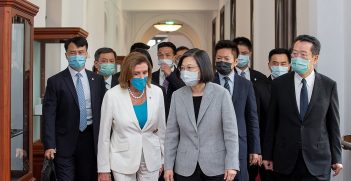The End of Pacifist Japan?

In elections in July, the Liberal Democratic Party of Japan secured the necessary parliamentary majorities to put a referendum to the people on changing the constitution. However, Japanese public opinion and Emperor Akihito’s expressed desire to abdicate are obstacles Japanese Prime Minister Shinzo Abe must overcome in order to achieve the constitutional changes the government desires.
There can be no objection to the Japanese revising their constitution should they wish. The chief considerations for Japan’s friends abroad are: will the changes be determined in a transparent and inclusive way and will they enhance or retard the nation’s status as a modern liberal democracy?
The present constitution came into effect in 1947 during the post-war Allied occupation. It was intended by the US to prevent Japan from returning to the path of totalitarianism and militarism. The rights of citizens were bolstered and the powers of the state were curtailed, most famously by the pacifist Article 9 whereby Japan “forever” renounced war. In the 70 years since, the constitution has never been amended.
There are three main reasons why. First, any proposed amendment must clear high hurdles: two-thirds support in both houses of the Diet plus majority support in a referendum. Secondly, governments have been able to reinterpret the constitution largely to their liking: for example, although the basic law says “land, sea, and air forces…will never be maintained”, Japan today has 250,000 men and women in uniform backed by the world’s eighth biggest defence budget. Thirdly, constitutional revision has never been popular; most Japanese have been content to live in a pacifist nation.
So if governments can work within, or around, the basic law, why the renewed push for change?
Again, there are three key reasons. Japan’s ruling coalition and like-minded conservative parties only recently secured the overwhelming Diet majorities required to pass amendments. Secondly, in Prime Minister Shinzo Abe Japan has a popular leader ideologically committed to remaking the constitution to conform to indigenous traditional values. Thirdly, the security situation surrounding Japan has changed dramatically due to the rising military power of China and North Korea.
What sort of changes does Abe’s Liberal Democratic Party want?
In a draft proposal released by Abe’s Liberal Democratic Party (LDP) in 2012, the emperor would become head of state (not merely “symbol of the state“) and a national defence force would be prescribed. Other changes would alter the balance between the rights and obligations of citizens more in line with the discredited pre-war Meiji Constitution. According to Professor Aurelia George Mulgan of the Australian Defence Force Academy, “What the LDP draft is proposing is anti-liberal and potentially anti-democratic. Writing notions of public order and citizens’ obligations to the state into the constitution has a highly conservative and statist flavour.”
The LDP draft has little or no chance of being accepted in its present form. This, however, has not stopped the Abe administration from enacting laws in the spirit of its constitutional ambitions. In December 2013, the Diet passed a state secrecy law that, some believe, undermines the freedom of the press and citizens’ right to know. The following April, a long-standing ban on weapons exports was relaxed and in May this year new security laws came into effect expanding the role of Japan’s Self-Defense Forces and conferring new emergency powers on the executive.
The way these measures were implemented has raised concerns about the methods that might be used to achieve constitutional change. An example is the Cabinet’s decision to reinterpret the constitution to include the right of “collective self-defence“: allowing Japanese forces to go to the aid of another power if, in failing to do so, Japan’s own security would be threatened. The Cabinet Legislation Bureau, which advises on the drafting of laws, had previously said that collective self-defence was unconstitutional. But after Abe parachuted into the bureau a former diplomat supportive of his contrary view, lo and behold, new advice was forthcoming (with no written record of the deliberations kept for public scrutiny).
Shinzo Abe says he wants to revise the constitution before his term as LDP president expires in two years. The two Diet commissions charged with deciding the content of proposed amendments, however, have been moribund for the past year mainly because of strong public opposition to the passage of the security laws. Abe says the commissions should come up with concrete proposals before the end of the year: a tough ask.
One possibility is that the ruling coalition will try to steer through less controversial changes, avoiding a frontal assault on Article 9. The expressed desire of Emperor Akihito to abdicate might, for instance, facilitate the passage of a constitutional amendment. By combining some of the LDP’s agenda with amendments favoured by the opposition parties—for instance new privacy and environmental protections—a package of measures might be agreed that could be brought to a referendum. That, at least, would create the precedent for constitutional change.
In the absence of concrete proposals it is difficult to gauge public opinion. Polls indicate that most Japanese remain opposed to constitutional change when the question is put in general terms or, especially, if it relates to Article 9. But many respondents fall into the category of “unsure” and, when asked about specific proposals, such as an amendment to allow the emperor to abdicate, support for change is much stronger. With the government making the most of security threats to shape public opinion and the nation’s news media increasingly reluctant to challenge the Abe ascendancy, it is not impossible that conditions will prove conducive for the first historic changes to Japan’s basic law.
Walter Hamilton was the ABC’s Northeast Asia Correspondent, based in Tokyo, for 11 years. He addressed AIIA NSW members on Japan’s constitutional debate on 23 August in Sydney. This article is published under a Creative Commons Licence and may be republished with attribution.





